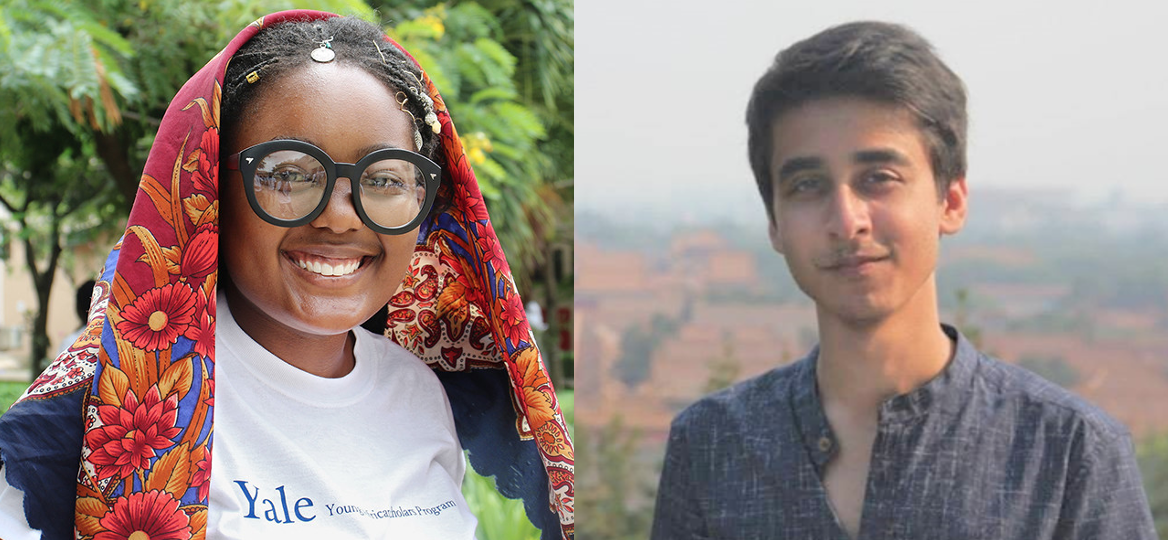Manas Punhani SOM ’21, Phyllis Mugadza ’21 named winners of the 2020 Reimagine Challenge
Two Yalies won an award for their proposals answering the overarching question of how we can make the world a better place.

Courtesy of Yale News and Manas Punhani
On Feb. 2, Manas Punhani SOM ’21 and Phyllis Mugadza ’21 were named winners of the 2020 Reimagine Challenge hosted by Schmidt Futures. They were each awarded a $25,000 scholarship, and the University received a matching grant for each winner.
The challenge was launched last August and aimed to explore the most innovative solutions to build back from COVID-19 and spark global movements for change, according to the award’s website. To be eligible, students had to be enrolled in a higher education institution and submit a preliminary 1,200-word proposal. Selected proposals then went on to a second round, where competitors were required to submit a 12-page proposal and short video pitch. Among 838 submissions from around the world, Punhani and Mugadza were selected among a group of 20 winners.
“We are incredibly proud to see Phyllis Mugadza and Manas Punhani selected among the twenty winners of the Schmidt Futures’ Reimagine Challenge 2020,” Deputy Dean for Alumni, Development, and Special Initiatives for the School of Management Joel Getz wrote in an email to the News. “In this award’s spirit, the Yale School of Management, Yale College, and Yale School of Public Health plan to use their funds for scholarships to support students who are creatively addressing urgent societal problems. We hope to continue to encourage innovative thinking that reflects our collective mission to educate leaders who serve all sectors of society.”
Competitors had to submit proposals addressing one of two questions from the challenge. The first asked students to identify how they could motivate one million people to work together on a project to make the world a better place within 10 years. The second question prompted competitors to write about community issues brought to light due to COVID-19 and how they could help their community respond to those pandemic-related challenges.
Both Punhani and Mugadza first heard about this competition through emails sent from the University.
“I thought that [the Reimagine Challenge] was a really good opportunity to take a step back and figure out what was wrong and how we could fix it,” Punhani said. “I felt like COVID exposed a lot of what was broken in our systems today, and a lot of what I was hearing about were stop-gap solutions. One thing that Schmidt Futures was trying to address was, let’s not just look at the short term, but let’s look at the long term, and could this crisis also be an opportunity for us to come out as a society stronger and better.”
Punhani’s proposal addressed the need for upskilling and reskilling migrants and refugees. He stated in his proposal that these populations were hit hardest by the COVID crisis but were not able to benefit from the pandemic relief policies enacted by countries around the world.
Thus, to aid these communities, Punhani proposed to kickstart an online learning platform from which migrants and refugees can get “globally accredited certifications and degree-granting programs.” This platform would be called “Noli Cedere Cognoscere,” a Latin phrase that means “never stop learning.”
Mugadza’s proposal, which responded to the challenge’s first prompt, sought to find a solution for the global waste crisis.
“Contrary to popular belief, a lot of waste has been dumped into oceans, is taken to landfills, or shipped to countries with poor waste management systems, like my country Zimbabwe,” Mugadza said. “Although these developing nations have become a dumping site for industrialized nations, they are a source of genius ways to turn our trash into treasure.”
Mugadza elaborates in her proposal that through a search on Google, one can see how Africans have been upcycling materials and turning waste such as soda cans and plastic into “art, accessories and useful equipment such as wastebaskets.” Her goal is to develop “makerspaces” for makers who are upcycling waste in their craft to get support, supplies, tools and income. She also wants to develop a larger physical center to allow makers to sell their products and have an opportunity to enroll in courses.
The idea behind Mugadza’s proposal has actually been in the works for a long time. Mugadza’s father had always been encouraging her to participate in a global challenge. A few years ago, Mugadza submitted a similar waste management proposal to a global competition. Around the time her father died in August of last year, Mugadza started receiving emails regarding the Reimagine Challenge and recalled the proposal she had previously submitted.
“When I saw that I could [match] this [old] proposal with the competition’s prompt, I really wanted to do it for him,” Mugadza said. “I used the same idea, but I wrote about it completely differently, and now I understand the complexity of these problems even better.”
More information regarding the proposals of the 2020 Reimagine Challenge winners and the Schmidt Futures can be found on the Schmidt Futures website.
Kerui Yang | kerui.yang@yale.edu







